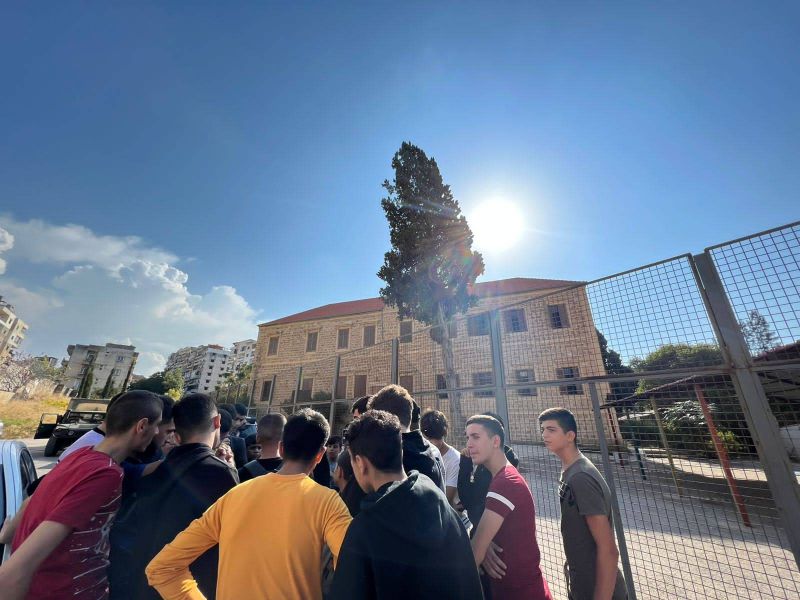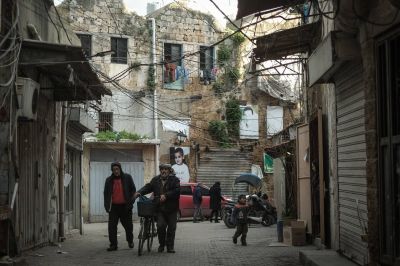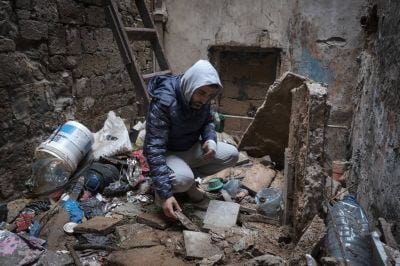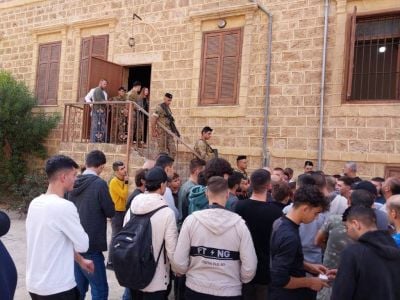
Last December in Tripoli, the collapse of the ceiling of a public school caused the death of a 16-year-old student. (Credit: Souhayb Jawhar)
Schools in Lebanon were officially closed on Tuesday. The decision, announced by caretaker Education Minister Abbas Halabi, came after two tremors were felt on Monday evening. The tremors occurred two weeks after the devastating Feb. 6 earthquake that killed more than 46,000 people in Turkey and Syria.
The purpose of the decision was to give heads of educational institutions time “to conduct a new engineering inspection on buildings to ensure that there are no cracks,” and to seek assistance from “the municipalities, the Order of Engineers and Architects and the Higher Relief Committee” and “report any threats to school buildings.”
Is this decision justified?
While the measure reassures some parents who are concerned about the safety of their children, the decision to close schools came in the midst of an open strike staged by public school teachers.
Similar threats of strikes have been made by private schools, reflecting the instability experienced by Lebanon’s education institutions after three chaotic school years marked by COVID-19, the collapse of the Lira and the October Revolution.
“My decision to close schools for one day following the earthquake is a prudent, preventive and at the same time mandatory measure,” Halabi told L’Orient-Le Jour.
Dilapidated public buildings
Public and private institutions face different problems. Public education institutions, which hold a third of the country’s students as well as some Syrian refugees, suffer from a lack of suitable building infrastructure. The reliability of these buildings and the safety of students in public institutions falls within the scope of responsibility of the Lebanese state.
“We are facing a big problem, mainly in the north of the country. We don’t have enough money to repair the dilapidated buildings, which have been further weakened by the multiple earthquakes, especially when it comes to major repairs,” said Halabi.
While the Lebanese government awaits talks with UNICEF, the ministry has evacuated dangerous buildings and regrouped students in the buildings deemed to be safer.
“I refuse to endanger the lives of students,” said Halabi.
Meanwhile, private institutions, which hold 70 percent of country’s students in Lebanon, are themselves responsible for ensuring the safety of their buildings.
“We urge them to assume their responsibilities,” said the minister.
Since Halabi’s decision was issued, the ministry’s teams have been working to check the conditions of buildings.
“Whether there are cracks, water seepage or structural decay, we are checking everything, about 10 schools a day,” said Maya Samaha, an architect and urban planner at the Education Ministry.
“Out of 1,236 public buildings used as primary and secondary schools across the country, only a dozen have so far been considered unfit to receive students,” she said, adding that their dilapidation has nothing to do with the earthquakes.
The educational community is divided over the decision to take a day off. The ministry’s director-general Imad Achkar justified the measure and said that there would be criticism regardless of the decision taken.
“Can you imagine the risks of panic among students in case of a strong aftershock?” he said.
“After the Feb. 6 earthquake, the minister’s decision not to close schools was severely criticized,” said Achkar.
“There were even insults from parents, denouncing the decision as immoral. This time, criticism came from those who wanted to keep the schools open.”
What about earthquake standards?
The Secretary-General of Catholic Schools, Father Youssef Nasr, agrees.
“The education minister’s decision is reasonable. On the one hand, the earthquake created panic and traumatized the population, because it was particularly strong. On the other hand, it is necessary to closely inspect the buildings after the tremors,” he said.
Father Nasr was quick to relay the minister’s instructions to the heads of private schools.
“They must take their responsibilities and ensure that the infrastructure can accommodate students safely,” Nasr added.
Parents are divided, as usual. “I understand the minister’s decision. Not only does he take responsibility for all students, private and public, but he is also ensuring that the heads of private schools shoulder their responsibilities,” said Raymond Feghali, president of an association grouping 50 parents' committees in Beirut and Mount Lebanon.
Other parents are less convinced and worried about the learning delays that have been accumulating since the beginning of the crises that have gripped the country.
“We would have preferred that schools were not forced to close their doors,” said Rafic Fakhry, president of an association grouping some 30 parents’ committees in Kesrouan-Ftouh and Jbeil.
Fakhry said he worries that an extra day off is a day needlessly lost.
“With the crisis, we are faced with the challenge of completing the remaining three months without strike, without interruption, with due respect to the rights of the educational community, students, teachers, and institutions,” he said.
Abdo Gebrayel, president of the parents’ committee in Metn, is not convinced that all 1,600 private school buildings in the country have been inspected on that single day off.
“It is an arbitrary decision to close schools, without planning or awareness,” he said.
With or without the earthquake, major problems in Lebanon’s education sector persist in both private and public schools. Most schools were built before Lebanon’s seismic building law was enacted in 2012. Rehabilitating these institutions in line with the 2012 standards is expensive and few institutions can afford to do that today.
This article was originally published in French in L'Orient-Le Jour. Translation by Joelle El Khoury.


